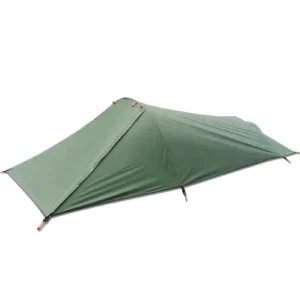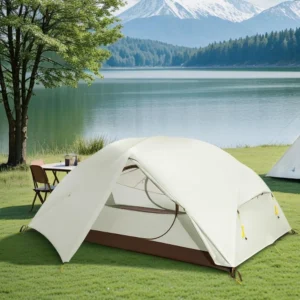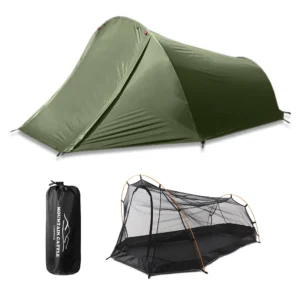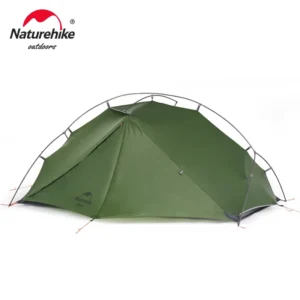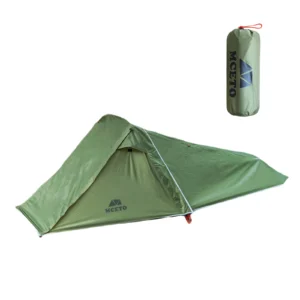Why Tent Weight Matters for Your Outdoor Experience
When planning a backpacking trip, every ounce you carry affects your experience on the trail. Tent weight stands as one of the most significant factors in your gear selection process, with direct impact on your overall comfort and mobility.
Your tent typically represents 15-20% of your base weight (all gear excluding consumables), making it one of the heaviest single items in your pack. This weight directly influences:
- Physical exertion: Each additional pound requires approximately 5-10 extra calories burned per mile, multiplied over days of hiking
- Distance potential: Heavier loads generally mean covering fewer miles per day
- Terrain accessibility: Lighter packs allow access to steeper, more technical terrain
- Overall enjoyment: Less weight often equals less fatigue and more enjoyment
Consider two hikers on the same 10-mile trail—one carrying a 1kg tent and another with a 3kg shelter. By day’s end, the second hiker will have expended significantly more energy just to transport their shelter, energy that could have been used for covering more distance or simply enjoying the surroundings.
Understanding compact shelters for two campers becomes essential when evaluating whether a 2kg tent aligns with your specific outdoor needs. The right weight for your adventure depends entirely on context—what might be perfectly acceptable for one backpacker could be burdensome for another.
Understanding What 2kg (4.4 lbs) Means in Different Scenarios
Whether 2kg qualifies as “too heavy” depends entirely on how and where you plan to use your tent. Let’s examine what this weight means across various outdoor activities:
- Solo backpacking: At 2kg (4.4 lbs), your shelter represents a significant portion of your pack weight, and might be considered moderately heavy for a single person
- Two-person backpacking: When shared between partners, a 2kg tent becomes just 1kg (2.2 lbs) per person—quite reasonable for most backpackers
- Car camping: Weight becomes almost irrelevant; comfort and weather protection take priority
- Bikepacking: 2kg can be substantial when carried on a bike, especially considering limited storage capacity
- Mountaineering: A 2kg tent might actually be light if it provides necessary protection against extreme conditions
The weight-to-space ratio also matters significantly. A 2kg tent offering minimal interior space provides less value than one of similar weight with generous living quarters. Understanding how lightweight tent benefits extend to longer hikes helps put this weight consideration into proper perspective.
Consider your specific circumstances: a weekend warrior might comfortably carry more weight for shorter trips, while someone embarking on a thru-hike covering thousands of miles will feel every extra ounce multiplied over months on the trail.
Key Factors That Determine If 2kg (4.4 lbs) Is “Too Heavy” For You
Activity Type and Intensity
The nature of your outdoor activity significantly influences appropriate tent weight. For casual weekend camping with moderate hiking distances, a 2kg tent falls within reasonable range. However, for ultralight backpacking, thru-hiking, or fast-packing, enthusiasts typically aim for tents under 1.5kg (3.3 lbs) or even sub-1kg for true ultralight setups.
Understanding what makes a tent ultralight helps contextualize whether 2kg meets your specific adventure style. Within the ultralight community (base weight under 10 lbs/4.5kg), a 2kg tent would consume nearly half the target weight. For lightweight backpackers (base weight under 20 lbs/9kg), it remains acceptable.
Trip Duration and Distance
Longer journeys amplify the importance of tent weight. Consider:
- Weekend trips: A 2kg tent creates minimal burden over short distances
- Week-long adventures: Weight becomes more noticeable but remains manageable for most
- Thru-hikes: Over hundreds or thousands of miles, carrying unnecessary ounces becomes physically taxing
Hikers covering 15+ miles daily will experience more significant hiking endurance impact from tent weight than those hiking 5-8 miles per day.
Environmental Conditions
The environments you explore directly influence appropriate tent weight:
- Summer conditions: Allow for lighter shelters with minimal weather protection
- Three-season use: Often requires moderate weather protection at a reasonable weight
- Winter camping: Demands robust materials that can withstand snow loads and high winds, justifying additional weight
- High altitude: Requires stronger materials and frames, often necessitating heavier designs
Personal Physical Condition
Your fitness level, strength, and previous experience carrying loads matters tremendously:
- Experienced backpackers with conditioned bodies might handle heavier loads with minimal discomfort
- Newer hikers or those with physical limitations might find 2kg (4.4 lbs) creates excessive strain
- Age and physical condition directly affect how much weight you can comfortably carry
Overall Pack Weight Philosophy
Consider your tent weight within your broader pack strategy:
- Minimalists who count every gram will find 2kg excessive
- Comfort-oriented backpackers who prioritize camp amenities may find 2kg perfectly acceptable
- Weight distribution specialists who balance weight across all gear categories might accommodate a slightly heavier tent by reducing weight elsewhere
Understanding Tent Weight Specifications and Terminology
Manufacturers list several weight measurements that often confuse buyers. Understanding these specifications helps you evaluate whether a 2kg tent truly meets your needs:
- Minimum Trail Weight: Typically includes only the tent body, rainfly, and poles—the absolute minimum needed for setup. This is the weight most commonly advertised.
- Packaged Weight: Includes everything in the box—tent, rainfly, poles, stakes, guy lines, stuff sacks, and instructions. May be 10-20% higher than the minimum weight.
- Packed Weight: Sometimes used interchangeably with packaged weight, but may refer to what you actually carry (excluding packaging materials).
- Fast-Pitch Weight: If applicable, the weight when using only the rainfly, footprint, and poles for a minimalist setup.
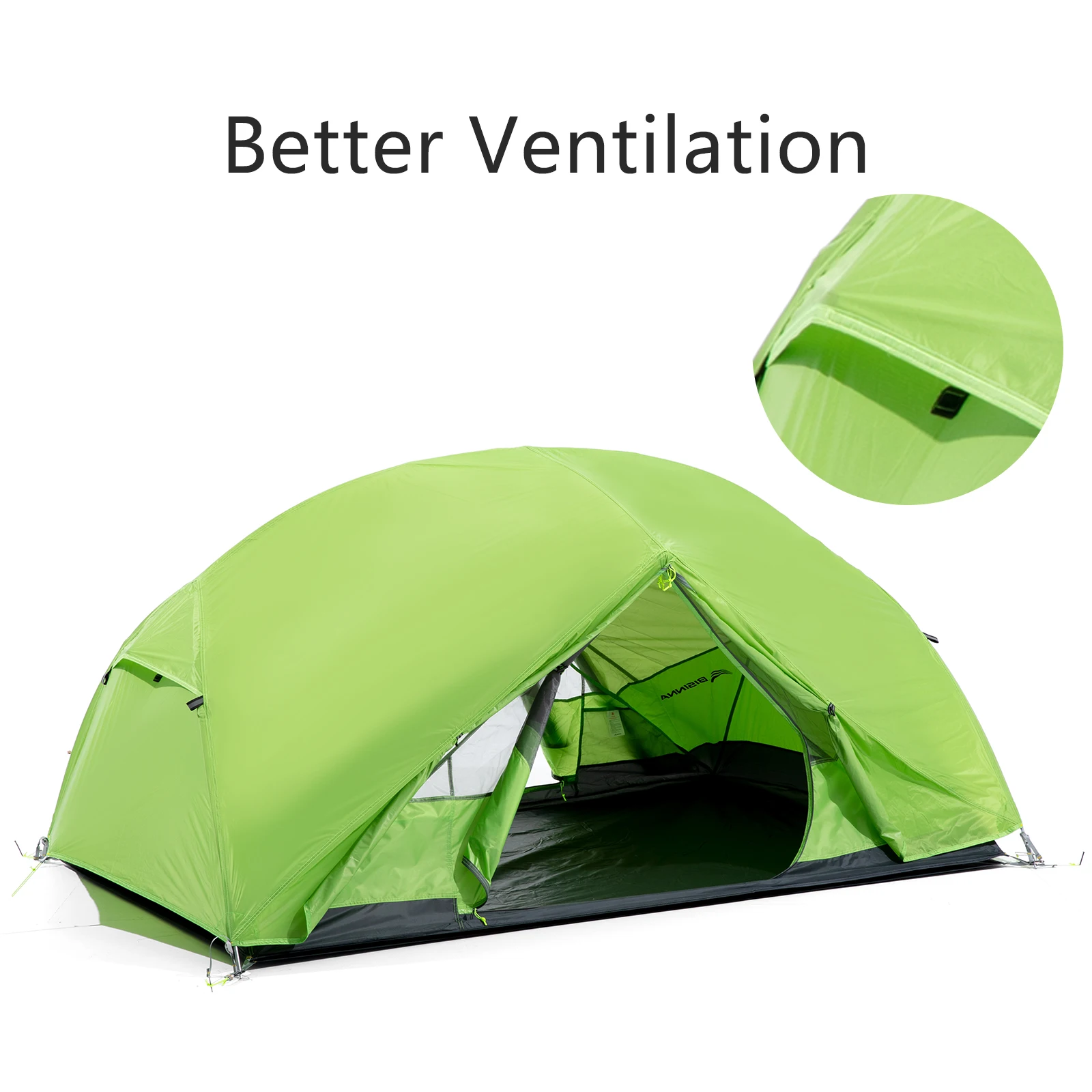
When evaluating a 2kg tent, determine which weight specification that represents. A tent listed at 2kg minimum weight could actually weigh closer to 2.3-2.4kg (5.1-5.3 lbs) when fully packed.
Understanding the components and setup process involved in mastering two-person lightweight tent setup can help you identify opportunities to leave certain components behind when appropriate, reducing your carried weight.
Tent Weight Classification: From Ultralight to Heavy
The outdoor industry classifies tents into weight categories that provide useful benchmarks. Here’s where a 2kg (4.4 lbs) tent fits within these categories:
| Capacity | Ultralight | Lightweight | Standard | Heavy |
|---|---|---|---|---|
| 1-Person | Under 1kg (2.2 lbs) | 1-1.5kg (2.2-3.3 lbs) | 1.5-2kg (3.3-4.4 lbs) | Over 2kg (4.4 lbs) |
| 2-Person | Under 1.5kg (3.3 lbs) | 1.5-2.2kg (3.3-4.9 lbs) | 2.2-3kg (4.9-6.6 lbs) | Over 3kg (6.6 lbs) |
| 3-Person | Under 2kg (4.4 lbs) | 2-2.5kg (4.4-5.5 lbs) | 2.5-3.5kg (5.5-7.7 lbs) | Over 3.5kg (7.7 lbs) |
According to this classification, a 2kg tent would be considered:
– At the heavy end for solo use
– Within the lightweight category for two-person use
– Ultralight for three-person use
It’s worth noting that these weight expectations have shifted dramatically over time. A decade ago, a 2kg two-person tent would have been considered remarkably light. Today’s advanced materials and designs have pushed boundaries further.
For those focused specifically on minimizing weight, exploring ultralight backpacking tent options provides alternatives that can reduce your shelter weight by 30-50%.
The Inevitable Trade-Offs: What You Gain and Lose with Tent Weight
When evaluating whether 2kg is too heavy for your needs, understanding the inherent trade-offs between weight and other factors becomes essential:
Weight vs. Durability
Lighter tents typically use thinner fabrics with lower denier ratings. A ultralight tent might use 10-20D fabrics, while standard tents employ 50-70D materials. This difference makes lightweight options more vulnerable to abrasion, punctures, and UV degradation over time.
Consider your usage patterns—frequent backpacking on rough terrain might justify the extra weight of more durable materials that won’t require replacement as often.
Weight vs. Interior Space and Comfort
Weight reduction often comes at the expense of livable space. Lighter tents typically offer:
– Less floor area (sometimes 10-20% less than standard tents)
– Lower peak heights (sometimes by 4-8 inches)
– More tapered designs that limit usable space
– Smaller vestibules for gear storage
After a long day hiking, this spatial difference can significantly impact your comfort and ability to organize gear.
Weight vs. Weather Protection
Lighter designs may compromise weather resistance through:
– Fewer poles creating less stable structures in high winds
– Reduced vestibule coverage
– Less robust waterproofing
– Limited ventilation options to prevent condensation
Weight vs. Cost
Perhaps the most stark trade-off exists between weight and price. Ultralight materials often cost significantly more—sometimes 50-100% more than standard versions with similar features. A 1kg (2.2 lbs) tent might cost twice as much as a 2kg (4.4 lbs) model with similar protection.
For those seeking balanced options, lightweight backpacking tent varieties offer reasonable compromises between weight savings and these other critical factors.
How to Evaluate and Reduce Your Tent Weight Effectively
If you’ve determined your 2kg tent might be too heavy for your specific needs, consider these practical approaches to reduce weight:
Evaluate Needs vs. Wants
Start by distinguishing between essential features and luxuries:
– Do you really need two doors and vestibules?
– Is full standing height necessary?
– Could you manage with slightly less floor space?
Reduce Weight Without Buying New Gear
Several tactics can lighten your existing tent:
– Replace heavy stakes with lightweight alternatives (potential savings: 50-100g)
– Leave the stuff sack at home (potential savings: 20-50g)
– Use trekking poles for support instead of tent poles when design allows
– Leave behind unnecessary components for fair-weather trips
Distribute Weight Strategically
For group trips, distribute tent components among hikers:
– One person carries poles and stakes
– Another carries the tent body
– A third carries the rainfly
This distribution makes a 2kg tent feel significantly lighter per person.
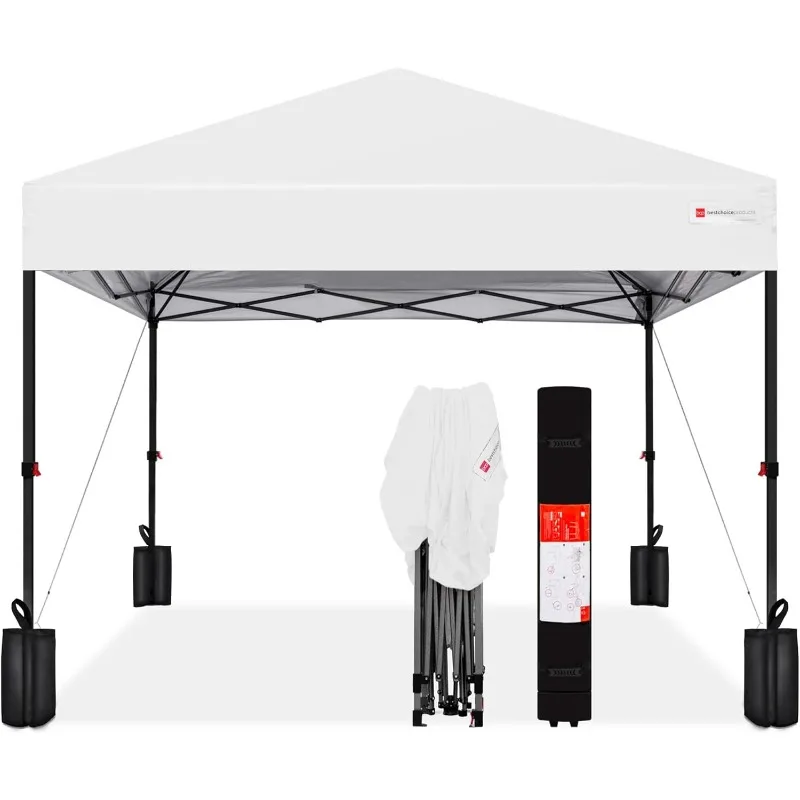
Consider Alternative Shelter Systems
For substantial weight reduction, trekking pole backpacking tent options eliminate dedicated poles, often reducing weight by 20-30%. Exploring diverse camping shelter options for two reveals numerous alternatives that maintain protection while reducing weight.
Lightweight Backpacking Tent, Ultralight Backpacking Tent, Ultralight Bivy Tent
Ultralight Single Person Camping Tent with Aluminum Poles for 3-Season Backpacking Waterproof DesignPrice range: $94.88 through $326.82 Select options This product has multiple variants. The options may be chosen on the product pageLightweight Backpacking Tent, Ultralight Backpacking Tent, Waterproof Backpacking Tent
$391.05 Select options This product has multiple variants. The options may be chosen on the product pageCompact Backpacking Tent, Lightweight Backpacking Tent, Waterproof Camping Tent
$335.52 Select options This product has multiple variants. The options may be chosen on the product pageUltralight Backpacking Tent, Ultralight Dome Tent, Winter Camping Tent
Price range: $369.63 through $370.07 Select options This product has multiple variants. The options may be chosen on the product pageBackpacking Tent with Vestibule, Freestanding Backpacking Tent, Lightweight Backpacking Tent
Price range: $446.89 through $447.22 Select options This product has multiple variants. The options may be chosen on the product pageBackpacking Tent with Vestibule, Trekking Pole Backpacking Tent, Waterproof Camping Tent
Price range: $271.99 through $519.52 Select options This product has multiple variants. The options may be chosen on the product page
Modern Tent Materials and Their Impact on Weight
Understanding tent materials helps explain why weight varies so dramatically between models:
Dyneema Composite Fabric (DCF)
- Ultra-lightweight (often 30-50% lighter than nylon)
- Exceptional strength-to-weight ratio
- Waterproof without additional coatings
- Minimal stretch when wet
- Drawbacks: Expensive (often doubling tent cost), poor abrasion resistance, noisy in wind
Silnylon
- Nylon impregnated with silicone
- Good balance of cost, weight, and durability
- Better abrasion resistance than DCF
- Drawbacks: Stretches when wet, requiring readjustment
Silpoly
- Polyester with silicone treatment
- Minimal stretching when wet
- Good UV resistance
- Slightly heavier than silnylon
Traditional Coated Nylon
- Most affordable option
- Reasonable durability at higher denier counts
- Drawbacks: Heavier, less water resistant than newer materials
The most durable tent material might add weight but could save money long-term through longevity. For those prioritizing absolute minimum weight, ultralight trekking pole tent options typically utilize the lightest materials available.
Is Your 2kg (4.4 lbs) Tent Actually “Too Heavy”? Decision Framework
To determine if 2kg exceeds appropriate weight for your needs, ask yourself these questions:
What’s my primary activity?
– Casual weekend trips: 2kg is likely acceptable
– Long-distance thru-hiking: Consider lighter options
– Winter mountaineering: 2kg might be impressively lightHow far do I typically hike per day?
– Under 8 miles: Weight less critical
– 8-15 miles: Consider your overall pack weight
– Over 15 miles: Prioritize weight reductionHow will the tent be used?
– Solo use: 2kg is relatively heavy
– Shared between two people: 2kg is quite reasonable
– Car camping with short hikes: Weight negligibleWhat’s my physical condition and comfort carrying weight?
– Strong, experienced: 2kg likely manageable
– Limited experience or physical considerations: Consider lighter optionsWhat’s my overall pack weight?
– If your base weight exceeds 15 lbs (6.8kg): Tent reduction offers substantial benefit
– If you’re ultralight in other categories: You might accommodate a slightly heavier tent

Remember that “too heavy” remains subjective—what feels burdensome to one backpacker might be perfectly comfortable for another. The combined answers to these questions will guide your personal conclusion.
When to Consider Alternative Shelter Systems
If you’ve determined your 2kg tent exceeds your weight preferences, several alternative shelter systems might better serve your needs:
- Tarp shelters: Minimalist protection weighing as little as 200-500g (0.4-1.1 lbs), requiring trekking poles or trees for setup
- Hammock systems: Complete setups (including rain protection) from 1-1.5kg (2.2-3.3 lbs), requiring suitable trees
- Bivy sacks: Ultraminimal protection at 350-700g (0.7-1.5 lbs), with limited living space but maximum weight savings
- Trekking pole tents: Full protection at 700g-1.2kg (1.5-2.6 lbs) by utilizing poles you’re already carrying
These alternatives often work best in specific environments—tarps excel in forested areas with moderate weather, while ultralight bivy tent options provide security in exposed terrain where setup options are limited.
Frequently Asked Questions About Tent Weight
Is it better to have a lighter tent or a more spacious one?
This depends entirely on your priorities. For shorter trips or when comfort at camp is paramount, additional space often justifies extra weight. For longer journeys where you primarily use your tent for sleeping, prioritize weight savings.
How much of my pack weight should my shelter represent?
Most backpackers aim for their shelter to constitute 15-20% of base weight. For a 12lb (5.4kg) base weight, that suggests a tent between 1.8-2.4lbs (0.8-1.1kg).
Can a tent be too light for safety?
Yes. Extremely lightweight shelters might sacrifice weather protection, durability, or structural integrity. Always ensure your shelter matches the conditions you expect to encounter.
How much weight difference is actually noticeable when backpacking?
Most hikers can detect a 200g (7oz) difference when directly comparing packs. Over a full day of hiking, even small weight reductions contribute to significantly less fatigue.
Should I prioritize reducing tent weight over sleeping bag or pad weight?
Focus on your heaviest items first. If your tent weighs 2kg but your sleeping bag weighs 1kg, you’ll gain more by upgrading the tent. For deeper insights on weight considerations, explore whether 3kg backpacking tents are too heavy for different scenarios.


